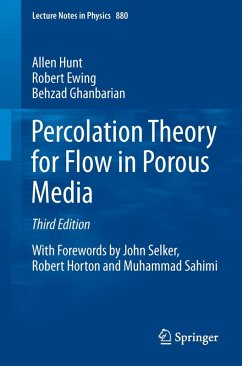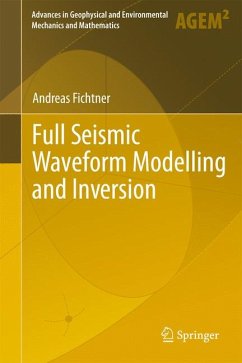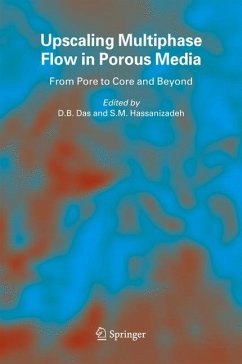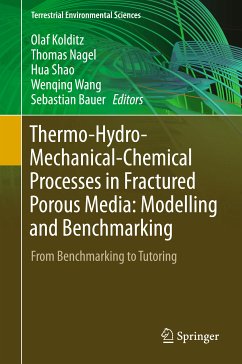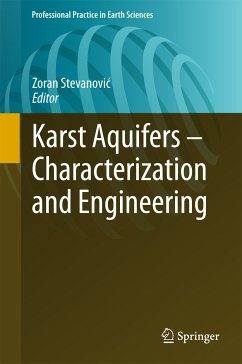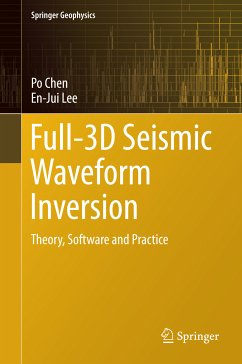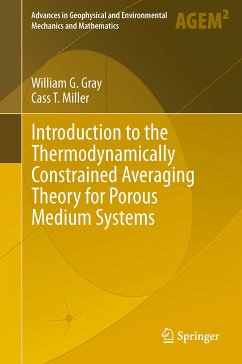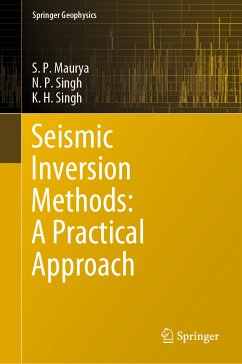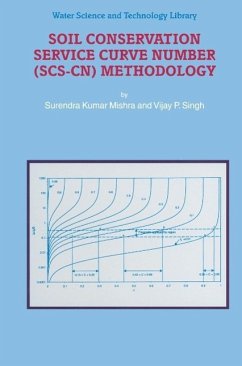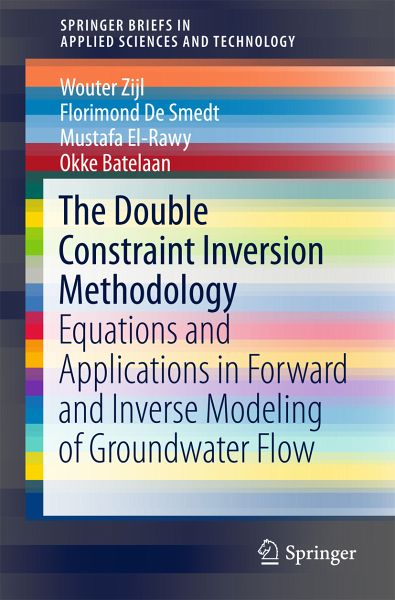
The Double Constraint Inversion Methodology (eBook, PDF)
Equations and Applications in Forward and Inverse Modeling of Groundwater Flow
Versandkostenfrei!
Sofort per Download lieferbar
Weitere Ausgaben:

PAYBACK Punkte
20 °P sammeln!





Includes hydrogeological case studies demonstrating the practical relevance of the approach
Explains how to apply the inversion methodology using comprehensible mathematics
Clarifies the differences between inversion methods
Explains how to apply the inversion methodology using comprehensible mathematics
Clarifies the differences between inversion methods
Dieser Download kann aus rechtlichen Gründen nur mit Rechnungsadresse in A, B, BG, CY, CZ, D, DK, EW, E, FIN, F, GR, HR, H, IRL, I, LT, L, LR, M, NL, PL, P, R, S, SLO, SK ausgeliefert werden.
Wouter Zijl received his Ph.D. in 1978 from Eindhoven University of Technology (TU/e) in Technical Physics, with emphasis on free surface flow applied to two-phase flow. In 1973 he received his M.Sc. degree in Technical Physics, also from TU/e, on ionization phenomena in shock waves. In 1966 he received his B.Sc. degree in Electrical Engineering from the Higher Institute of Technology Amsterdam (HTS-A). He has been working as head of the Thermal Hydraulics department at Neratoom B.V. in The Hague, and as senior Geophysicist, Petroleum Reservoir Engineer and Hydrogeologist at the Netherlands Organization for Applied Scientific Research. Presently he is visiting professor at Vrije Universiteit Brussel (VUB). His expertise includes fluid dynamics in clear and porous media, geophysical modeling (imaging, calibration, data assimilation, scale analysis), geomechanics and applied mathematical physics in general. He is a member of the International Association of Hydrogeologists (IAH) and of the European Association of Geoscientists and Engineers (EAGE).
Mustafa El-Rawy received his Ph.D. from Vrije Universiteit Brussel (VUB) in Water Resources Engineering in 2013. He received his M.Sc. from Katholieke Universiteit Leuven (KUL) and Vrije Universiteit Brussel (VUB) in Water Resources Engineering (IUPWARE programme) in 2008. He received his B.Sc. degree Civil Engineering from Faculty of Engineering, Minia University, Minia, Egypt in 2002. He worked as a research scientist at Sultan Qaboos University, Muscat, Oman on the project of "Managed Aquifer Recharge using Treated Wastewater in Different Geological Setting of MENA Countries" (2014 - 2015). He has been awarded with a master scholarship from the VLIR-UOS, Belgium (2006- 2008), a PhD scholarship from the Erasmus Mundus External Cooperation Window (EMECW) Programme, and Vrije Universiteit Brussel (VUB), Belgium (2009 - 2013), a postdoctoral Fellowship from Sultan Qaboos University, Muscat, Oman (2014 - 2015), and apostdoctoral Fellowship from the Egyptian Ministry of High Education at the Vrije Universiteit Brussel, Brussels, Belgium (October, 2015 - March, 2016). He is currently working as an Assistant Professor in the Department of Civil Engineering, Faculty of Engineering, Minia University, Minia, Egypt and his expertise includes Inverse Groundwater Modeling, Managed aquifer Recharge (MAR), Groundwater Modeling, Water Resources Management, and Groundwater-Surface Water Interaction.
Florimond De Smedt received his Ph.D. from Vrije Universiteit Brussel (VUB) in Civil Engineering (Hydrology) in 1979, M.Sc. degree in Agronomy (Soil Physics) from New Mexico State University in 1979, and M.Sc. in Civil Engineering from VUB in 1973. He is Em. Professor and former Head of the Department of Hydrology and Hydraulic Engineering, VUB. His main fields of research are hydrogeology, groundwater modelling, hydrology, and physical land resources. He supervised 29 Ph.D. theses and about 100 M.Sc. theses and is author or co-author of 120 journal papers with impact factor, 10 books or chapters in books and 200 other scientific contributions.
Professor Okke Batelaan is a graduate of the Free University of Amsterdam, Netherlands (MSc - Hydrogeology) and of the Free University Brussels, Belgium (PhD - Engineering). He worked for 23 years at the Free University Brussels and led for 6 years the hydrogeology group at the KU Leuven, Belgium. Since 2012 Okke is Strategic Professor in Hydro(geo)logy, Dean of the School of the Environment (2015-2017), Flinders University. Okke has broad experience in teaching groundwater hydrology and modelling, GIS-remote sensing for hydrological applications. He supervised more than 140 MSc and 25 PhD students. His extensive research experience and a publication record covers shallow groundwater hydrology and modeling, recharge-discharge estimation and modeling, urban hydrology and distributed modelling, ecohydrology and impacts of landuse and climate change on groundwater systems. He coordinated-participated in a large number of projects in Europe, Africa, South America, Asia and Australia. He is editor-in-chief of Journal of Hydrology: Regional Studies.
Mustafa El-Rawy received his Ph.D. from Vrije Universiteit Brussel (VUB) in Water Resources Engineering in 2013. He received his M.Sc. from Katholieke Universiteit Leuven (KUL) and Vrije Universiteit Brussel (VUB) in Water Resources Engineering (IUPWARE programme) in 2008. He received his B.Sc. degree Civil Engineering from Faculty of Engineering, Minia University, Minia, Egypt in 2002. He worked as a research scientist at Sultan Qaboos University, Muscat, Oman on the project of "Managed Aquifer Recharge using Treated Wastewater in Different Geological Setting of MENA Countries" (2014 - 2015). He has been awarded with a master scholarship from the VLIR-UOS, Belgium (2006- 2008), a PhD scholarship from the Erasmus Mundus External Cooperation Window (EMECW) Programme, and Vrije Universiteit Brussel (VUB), Belgium (2009 - 2013), a postdoctoral Fellowship from Sultan Qaboos University, Muscat, Oman (2014 - 2015), and apostdoctoral Fellowship from the Egyptian Ministry of High Education at the Vrije Universiteit Brussel, Brussels, Belgium (October, 2015 - March, 2016). He is currently working as an Assistant Professor in the Department of Civil Engineering, Faculty of Engineering, Minia University, Minia, Egypt and his expertise includes Inverse Groundwater Modeling, Managed aquifer Recharge (MAR), Groundwater Modeling, Water Resources Management, and Groundwater-Surface Water Interaction.
Florimond De Smedt received his Ph.D. from Vrije Universiteit Brussel (VUB) in Civil Engineering (Hydrology) in 1979, M.Sc. degree in Agronomy (Soil Physics) from New Mexico State University in 1979, and M.Sc. in Civil Engineering from VUB in 1973. He is Em. Professor and former Head of the Department of Hydrology and Hydraulic Engineering, VUB. His main fields of research are hydrogeology, groundwater modelling, hydrology, and physical land resources. He supervised 29 Ph.D. theses and about 100 M.Sc. theses and is author or co-author of 120 journal papers with impact factor, 10 books or chapters in books and 200 other scientific contributions.
Professor Okke Batelaan is a graduate of the Free University of Amsterdam, Netherlands (MSc - Hydrogeology) and of the Free University Brussels, Belgium (PhD - Engineering). He worked for 23 years at the Free University Brussels and led for 6 years the hydrogeology group at the KU Leuven, Belgium. Since 2012 Okke is Strategic Professor in Hydro(geo)logy, Dean of the School of the Environment (2015-2017), Flinders University. Okke has broad experience in teaching groundwater hydrology and modelling, GIS-remote sensing for hydrological applications. He supervised more than 140 MSc and 25 PhD students. His extensive research experience and a publication record covers shallow groundwater hydrology and modeling, recharge-discharge estimation and modeling, urban hydrology and distributed modelling, ecohydrology and impacts of landuse and climate change on groundwater systems. He coordinated-participated in a large number of projects in Europe, Africa, South America, Asia and Australia. He is editor-in-chief of Journal of Hydrology: Regional Studies.
Produktdetails
- Verlag: Springer International Publishing
- Seitenzahl: 101
- Erscheinungstermin: 26. Dezember 2017
- Englisch
- ISBN-13: 9783319713427
- Artikelnr.: 52940528
Für dieses Produkt wurde noch keine Bewertung abgegeben. Wir würden uns sehr freuen, wenn du die erste Bewertung schreibst!
Eine Bewertung schreiben
Eine Bewertung schreiben
Andere Kunden interessierten sich für


